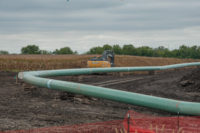Sweeping changes to National Environmental Policy Act (NEPA) regulations, finalized on July 15, are set to shorten the time it takes to get major construction projects approved, the White House says, in a pre-election COVID-19 economic stimulus move. But the revised rules, the most comprehensive since 1978 and set to take effect in September, are almost certain to face years of litigation by environmental groups and others, as well as reversal by a potential Democratic president.
[View text of final regulation here.]
“We’re not going to sit back and allow a decision that could harm public health during a public health crisis go unscathed. We’ll be seeing them in court,” said Kristen Boyles, staff attorney at Earthjustice.
Enacted in 1970 under President Richard Nixon, NEPA is considered one of the nation’s foundational environmental laws. It mandates that infrastructure projects requiring federal approval undergo reviews of their potential impacts on the environment and allow the public to weigh in with their concerns. The law’s originators said it seeks to put environmental protection on the same level as economic interests.
But construction groups have argued for years that while the goal of protecting the environment is a worthy one, the process itself is flawed. They say it can lead to lengthy and costly delays on important infrastructure projects because of duplicative requirements of different federal agencies and outdated methods for public participation that do not reflect modern technology.
President Trump, speaking at a UPS facility in Atlanta on July 15, said the new rule modernizes the NEPA review process and should cut years from the time required for required reviews. In some cases, a project review has taken 15 to 20 years, although the average is more typically five to seven.
The new final rules are effective Sept. 14, barring action by the courts. Under the changes, there is a time limit of two years to complete environmental impact statements, which apply to the largest projects, and one year to finish environmental assessments, a less extensive type of review.
The final regulations also seek to simplify paperwork and timelines for NEPA reviews by designating a lead agency to coordinate and manage the process, as opposed to separate deadlines and requirements for each agency with jurisdiction.
Construction groups weigh in
Stephen Sandherr, Associated General Contractors CEO, said in a statement that projects will still undergo environmental reviews that include public input and that the substance of the requirements—environmental protection—under the law remains unchanged.
“The difference is that reviews will last months, instead of years, and it will become slightly harder for special interests to delay the process with unmerited lawsuits,” he said.
In comments submitted to the White House in response to the January release of the revised NEPA rules proposal, David Bauer, president and CEO of the American Road and Transportation Builders Association, cited the review process for the $1.2-billion Interstate-70 widening project in Denver that he said took more than 13 years to complete, involved more than 200 public meetings and for which the Colorado Dept. of Transportation spent $40 million on studies.
At the end of the process, Bauer wrote, despite CDOT’s commitment to make 148 different environmental mitigation adjustments at an additional cost of $50 million, the project was still the subject of five separate legal actions. “This I-70 story provides the very definition of a broken NEPA process,” he said.
Environmental group will challenge
But environmental groups remain concerned about the administration’s removal of climate change as a factor to be considered in NEPA reviews and the new limit on the time the public has to comment on and challenge projects.
Kathleen Rent, Union of Concerned Scientists' executive director, said in a statement that the changes "weaken the ability of communities—especially communities of color—to weigh in on projects that could impact their own lives for a very long time."
Thaddeus Lightfoot, a former trial attorney with the U.S. Justice Dept.'s environment and natural resources division, notes that environmental organizations, in their expected legal challenges, may focus on the removal of climate change as a factor to be considered in environmental reviews.
Lightfoot, now a partner at law firm Dorsey & Whitney, says, “Although numerous federal courts hold climate change must be part of a NEPA review, [the administration] claims it can change the rule because ‘the terms direct and direct effects … and cumulative impact do not appear in the statute and thus their use is not required by NEPA.’ "
He adds, "That conclusion is certain to draw a legal challenge.”





Post a comment to this article
Report Abusive Comment